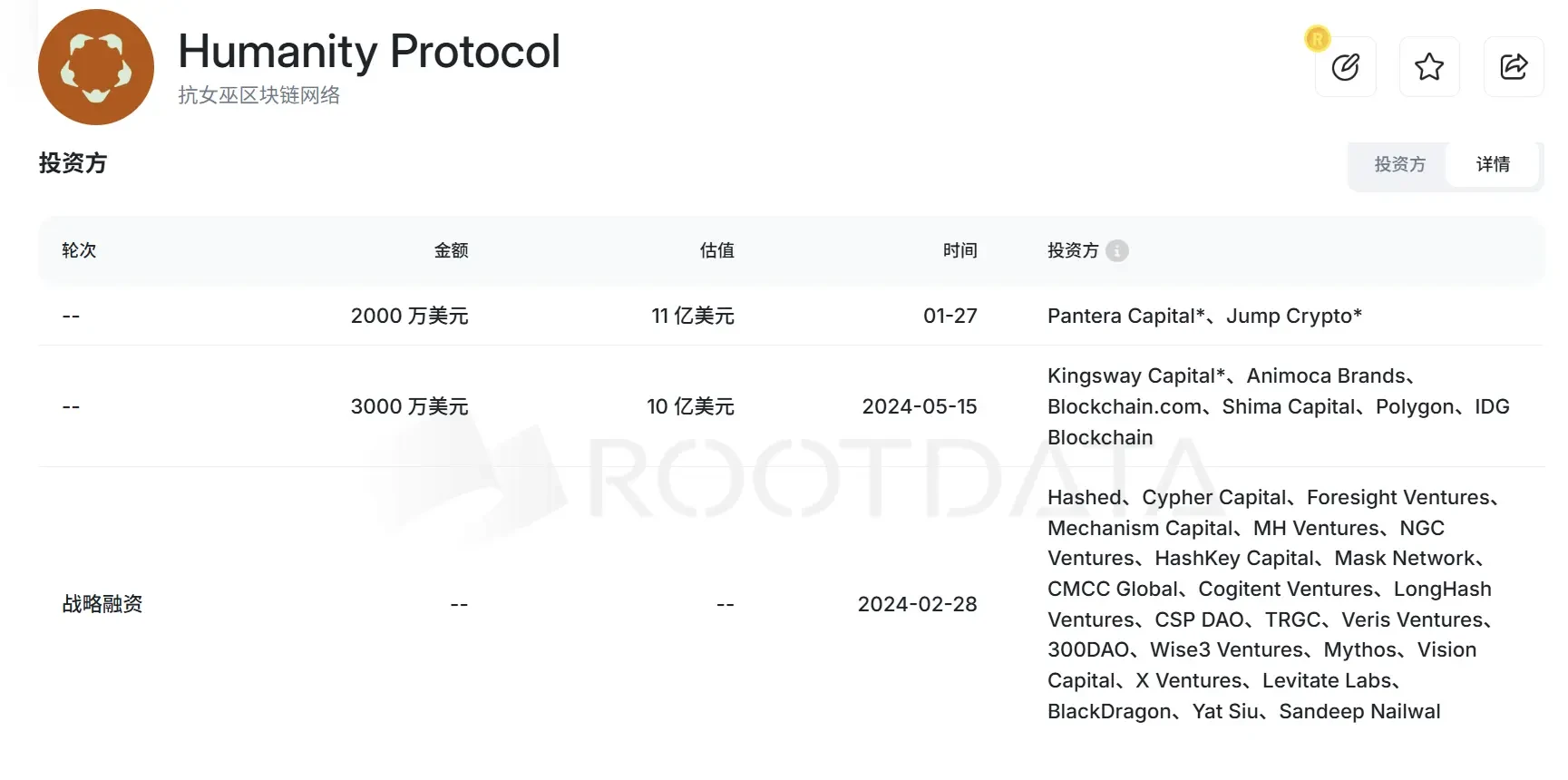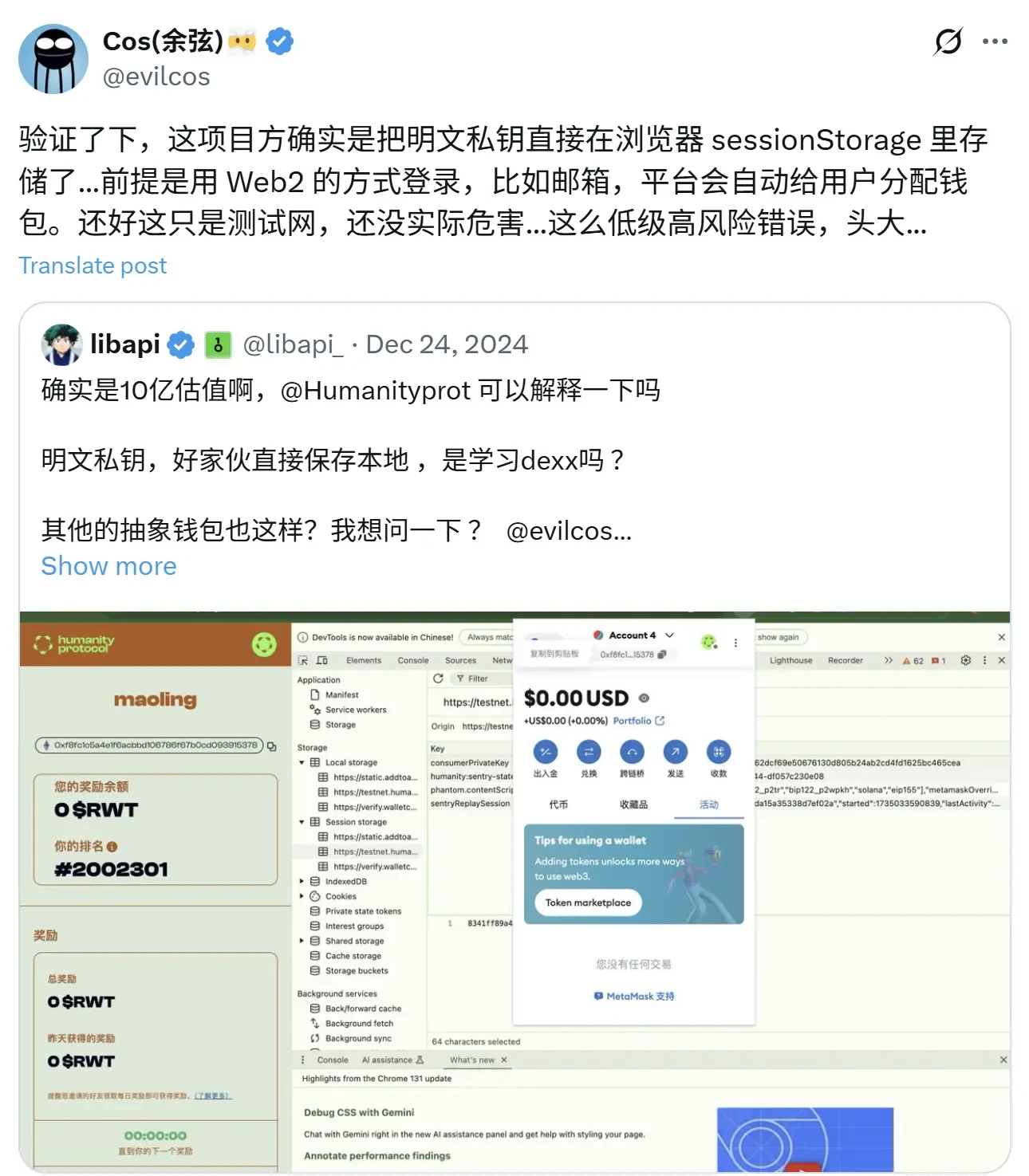Original Author: Fairy, ChainCatcher
Original Editor: TB, ChainCatcher
On one side, there is the enthusiastic support of top capital; on the other, there are controversies surrounding technical outsourcing and privacy issues. One side raises the banner of "anti-witch," while the other reveals the logo of a Shenzhen access control manufacturer hidden in the code.
Humanity Protocol, hailed as the "strongest anti-witch network," is a star project in Web3 identity verification, with a valuation exceeding $1.1 billion. Behind it stands a luxurious lineup of capital, including Pantera, Jump, and Animoca, and it was once seen as a strong competitor to Worldcoin.
However, on the other side of the spotlight, the facade of "technological revolution" and "privacy shield" is gradually peeling away. What kind of "double-sided drama" lies behind Humanity?
Capital Deification: The Fast-Track Code to a $1.1 Billion Valuation
Founded in 2023, Humanity Protocol's core selling point is a human proof system based on palm print recognition, claiming to solve the "witch" problem in the Web3 world through non-invasive biometric technology.
The capital's keen sense was quickly attracted: Humanity has completed three rounds of financing to date, raising over $50 million, with a fully diluted valuation reaching $1.1 billion. Investors include 31 well-known institutions such as Animoca Brands, Blockchain.com, Polygon, and IDG Blockchain.

The Humanity Foundation is also filled with big names, led by Animoca Brands Chairman Yat Siu, with co-founders including Mario Nawfal, founder of an international blockchain consulting firm, and Yeewai Chong, a senior investment expert from Morgan Stanley and Ortus Capital.
On June 17, the Android version supporting palm print scanning verification was released, with over 8 million users pre-registering for Human ID. Shortly after, on June 22, Binance announced the launch of Humanity Protocol (H) on the Alpha and contract markets. At this point, Humanity's development momentum seemed very strong, but with the launch of the airdrop activity, more hidden information was uncovered by netizens, and doubts began to emerge.
Core Technology from a Chinese Outsourcing Company?
According to X user @LianFang, Humanity Protocol may be a "domestic project shell," as the APP code library still contains images from Shenzhen access control manufacturer Zhangteng Information, and claims that the social platform's popularity is largely self-directed by the project team’s alternate accounts.
Crypto KOL AB Kuai.Dong further disclosed that Zhangteng Information is backed by a Shanghai outsourcing company specializing in comprehensive outsourcing services for identity verification systems. This stands in stark contrast to the "technological innovation" promoted by Humanity.
In response, Humanity founder Terence Kwok stated that Zhangteng Information was an early partner, and the related materials were "historical legacies" from the packaging process, emphasizing that the founder has a background as a former Tencent executive and has collaborated with UnionPay, possessing rich experience in the biometric field.
However, this response did not dispel community concerns. AB Kuai.Dong countered, asking if it was merely a partnership, why could they apply their code library, even including the cover of their company?
In fact, this is not the first time Humanity has sparked controversy on a technical level. As early as December 2024, Yu Xian, founder of Slow Mist Technology, pointed out on the X platform that Humanity had serious security vulnerabilities during the testnet phase: if users logged in using Web2 methods (such as email), the platform would automatically assign a wallet address and store the private key in plain text in the browser's sessionStorage.

The technical background of Humanity, wrapped in a glamorous package, gradually loses its luster with each revelation.
Founder’s Resume Shadow: A $170 Million "Cautionary Tale"
In the face of team controversies, Humanity Protocol founder Terence Kwok stated, "I am a Chinese person who has given up my U.S. passport and only holds a Hong Kong passport." However, as his background was further investigated, an unflattering entrepreneurial history emerged.
According to foreign media Protos, Terence Kwok nearly doomed his $1.5 billion smartphone company Tink Labs due to aggressive expansion, burning through over $170 million in investment funds. Tink Labs gained favor from giants like SoftBank and Foxconn by providing free smartphones to hotel guests but fell into trouble due to changes in the market environment, imbalanced operational models, and a broken capital chain, ultimately entering bankruptcy liquidation in 2020.
The former HR head of Tink Labs candidly stated, "I never expected it to last long, but I also didn't think it would collapse so quickly. Kwok only cared about making money." This "unicorn's fall" has now planted another seed of concern in users' minds.

Airdrop Becomes a "Joke"
On June 22, Humanity Protocol announced the launch of its first "Human Proof" Fairdrop airdrop, with eligible users including early testnet participants, real users, and contributors to the promotional community. However, this highly anticipated airdrop ultimately ignited collective anger within the community.
According to crypto KOL Bingwa, some people spent a year completing check-in tasks, only to receive an airdrop worth $1; many others were directly shown as "not meeting qualifications." Long-term community maintainers, content creators, and official Mod volunteers were also dismissed with "0 airdrop." Meanwhile, multiple ghost addresses appeared on-chain, with no interaction or contribution records, yet they received as much as 40,000 $H in airdrops.
Over the past year, Humanity frequently launched various "anti-witch" limited-time form-filling activities, requiring users to fill in detailed information, cooperate with verification, and participate in interactions. However, the reality is that these actions did not serve as genuine reference standards for the airdrop but were merely operations to create activity by the project team.
Humanity founder Terence Kwok responded to the airdrop controversy, stating, "We have noted the widespread feedback from the community and are seriously addressing the complaints regarding fair airdrop distribution." However, the project's future remains full of uncertainty, and the community is eagerly awaiting a more open, transparent, and responsible response.

Humanity Protocol has been elevated to the clouds by capital and vision, yet it teeters on the brink of collapse amid doubts and controversies. The so-called "innovation" packaging may just be another instance of capital hunting disguised by a technological narrative.
免责声明:本文章仅代表作者个人观点,不代表本平台的立场和观点。本文章仅供信息分享,不构成对任何人的任何投资建议。用户与作者之间的任何争议,与本平台无关。如网页中刊载的文章或图片涉及侵权,请提供相关的权利证明和身份证明发送邮件到support@aicoin.com,本平台相关工作人员将会进行核查。




